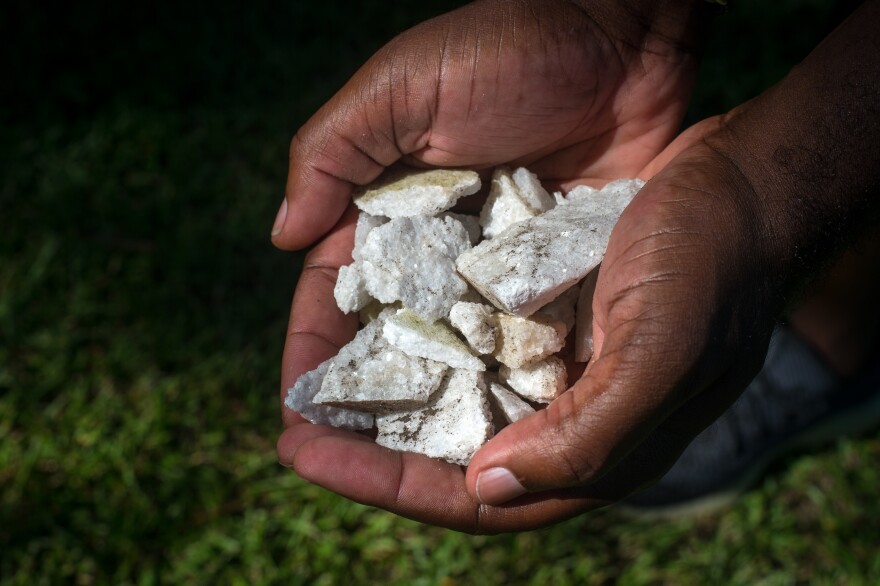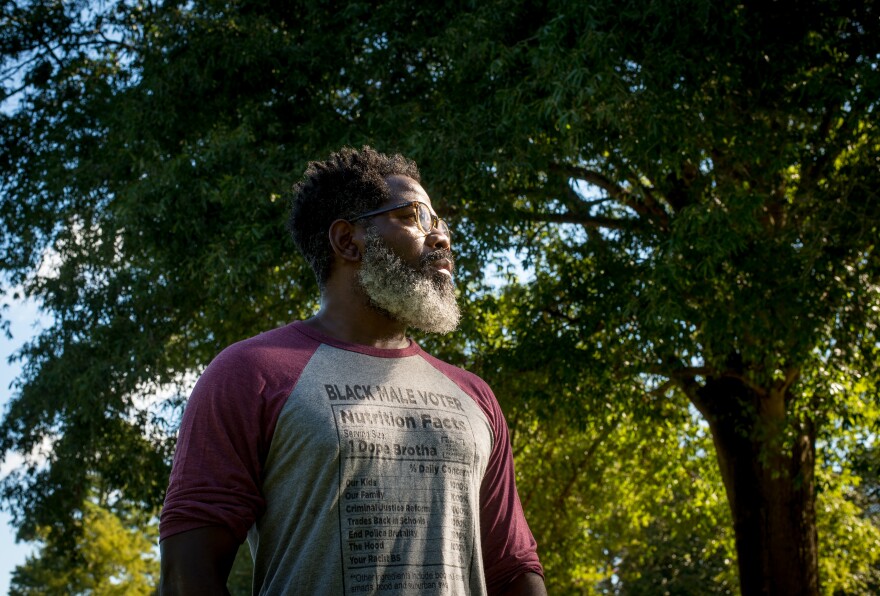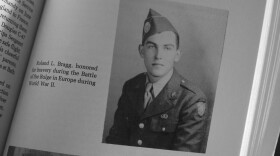For nearly 100 years, a monument to Confederate veterans stood in Enfield, a small town north of Rocky Mount.
Earlier this month, the town commission voted to remove it. Then, the mayor of Enfield, Mondale Robinson, volunteered to do it himself. He did it on Facebook Live with a hammer and bulldozer.
It attracted attention from well beyond Enfield. Robinson became the subject of a state investigation and the target of racist hate mail.
It also launched a new chapter in Robinson’s life as a community organizer and activist.
Enfield, past and present
Enfield has about 2,300 people. About 85% are Black.
It has the character of a lot of small Southern towns. There’s a set of train tracks that runs right through the middle with two- or three-story brick buildings on either side.


Robinson is showing me around.
"When this town was bustling in my mom’s and pop’s childhood, the businesses would close at nine and that’s the point when Black people had to leave," Robinson says. "The fire department is right here. The whistle would go off and Black folk knew it was time for them to get out from downtown or they’d be sprayed [with hoses] or worse."
On the side of one building is a sign in faded orange paint that says “Meyer’s,” a grocery store that’s long been out of business.
"My mom talks about going in here when she was younger, getting canned foods and when she came out, it was after nine o’clock," Robinson recalls. "So she got sprayed down the sidewalk. They call it ‘I was washed down the street.’ That’s what a lot of Black people their age refer to it as."
He says his father was charged with a felony after trying to defend his own mother from a white man who hit her.
"Those are probably some of the reasons I react the certain way I do when I see white supremacy, either in institutional spaces or in individual spaces," Robinson says.
Robinson grew up a few blocks west of Meyer's in a section of town known locally as Black Bottom.
On Gunter Street, where Robinson grew up, there’s a row of four condemned shotgun houses. Their foundations are crumbling, porches are sinking and their wood siding has faded to white and gray.
'White supremacy made me this person'
Robinson left Enfield when he was 17 to join the Marine Corps. He says he made a few good friends there, but had his own experiences that reinforced the stories he heard from his parents.

Then, in 2005, Robinson’s brother went to prison for shooting two white men in their legs after they spat on him and called him a racial slur.
"I gave him a ride away from the scene," Robinson says.
He was not charged at the time, and says he did not hear about it again until two years later, when he pleaded guilty to accessory after the fact and got six years’ probation.
"You plead or you go to trial and you lose, and you spend your life in prison," Robinson says.
"I was doing political work organizing, and I guess I pissed off the status quo. That was the greatest thing to happen to me, because it grounded me in what I already knew. My father's and my uncle's story is becoming my story. You make white people mad, you get a felony conviction or you get dead. Before that moment, I had never contemplated college. I ran through school with a 4.0 GPA, and became an organizing monster. And so, white supremacy made me this person."
With a newly earned associate's degree in political science, Robinson took consulting jobs around the country for Democratic or Independent candidates. He then worked to mobilize voters against North Carolina’s Amendment One, which banned same-sex marriage before the Supreme Court legalized it in 2015.
"That was my introduction into what I was gonna do forever," Robinson says. "I know how to organize Black people.
"And it can't be this transactional way where you show up two or three months before an election with a proverbial church fan and fried chicken, and think you're gonna move people."
The livestream and the fallout
Robinson’s video of the moment Enfield’s Confederate monument fell now has about 8,000 views on Facebook.
According to the UNC-Chapel Hill University Library, the United Daughters of the Confederacy dedicated the monument in 1928. It was a 10-foot tall marble slab with a Confederate flag carved in the middle. The town later added inscriptions to honor veterans of World War II and the wars in Korea, Vietnam and the Persian Gulf.
By WUNC's count, this was at least the 25th Confederate monument to come down in North Carolina since George Floyd's murder in 2020. There are still about 75 standing statewide.
"So the statue was right over here," Robinson says, pointing to a brown spot of earth underneath a U.S. flag. There are still bits of marble from the destroyed monument.

"There was a Confederate flag in front of a U.S. flag. The irony of that is unbelievable," he says.
Robinson lives just a block away from here.
"The day after I took down the monument, I came out the next day and there were trucks just lined up right here with white guys with guns on both sides," Robinson says, pointing to the road adjacent to his house.
The intimidation continued for days. Racist flyers claiming to be from the Ku Klux Klan started showing up around town. Robinson’s social media and email started blowing up. Some messages had explicit language and racial slurs. Others were threatening.
Robinson starts reading from a printed email: "'The Confederate states are still active today with members who will stand for their heritage. You will be watched closely. People will address you while you are working, when you are in public and doing your everyday outings. We are one, we are many. Sincerely, the Invisible Empire.'"
Robinson adds, "And of course the Invisible Empire is the [Ku Klux] Klan."
Emails like that prompted Robinson to take measures to protect himself, including vetting reporters who come to town.
"I definitely didn't blindly invite you down here," he tells me. "My team definitely ran the papers on Will Michaels before he came to Enfield. So, you passed the test, brother.
"If you're willing to hear the pain from Enfield with me as the conduit, then I'm definitely going to take whatever risk that means so that this sort of light can continue to be shown on this infection that we call white supremacy, and no one will be allowed — not one person — will be allowed to say it's not true... because we see it."
'America's tolerance for Black pain'
We walk back toward the center of town down the same road where Robinson says he remembers the Klan marching when he was in elementary school. On the way, Robinson waves or says hello to everyone who passes by.


This is partly because Robinson knows just about everyone in town, but it is also a system of protection.
"I've not seen any cops, not police, local or county sheriff drive past my house once to make sure that nothing nefarious is happening," Robinson says. "Local folk are driving past the house. They created their own schedule to make sure that nothing's happening to the mayor. And that is not their job."
At the request of Enfield’s police chief and the local District Attorney, the State Bureau of Investigation is looking into Robinson’s actions. North Carolina law protects public monuments with some exceptions. The SBI would not provide any more information about the investigation.
Before Mondale Robinson came back to Enfield last year, he started a group born out of his experience as a political organizer called the Black Male Voter Project.
Now, at age 43, he says he’s here for good. He wants to revitalize a program with Halifax Community College that taught Enfield residents computer literacy, interview skills and resume building.
By the end of his time in office, he wants Enfield to be "the best small town in the country," and he does not believe that is a cliché.
"I'm talking about providing residents a universal basic income, and housing that is modern and extremely efficient," Robinson says. "So, yeah, I mean that.
"I came home to fix what I thought was just the decay of buildings, but it's in the souls of some of the residents that we got to really deal with this... America’s tolerance for Black pain is unbelievably high."







